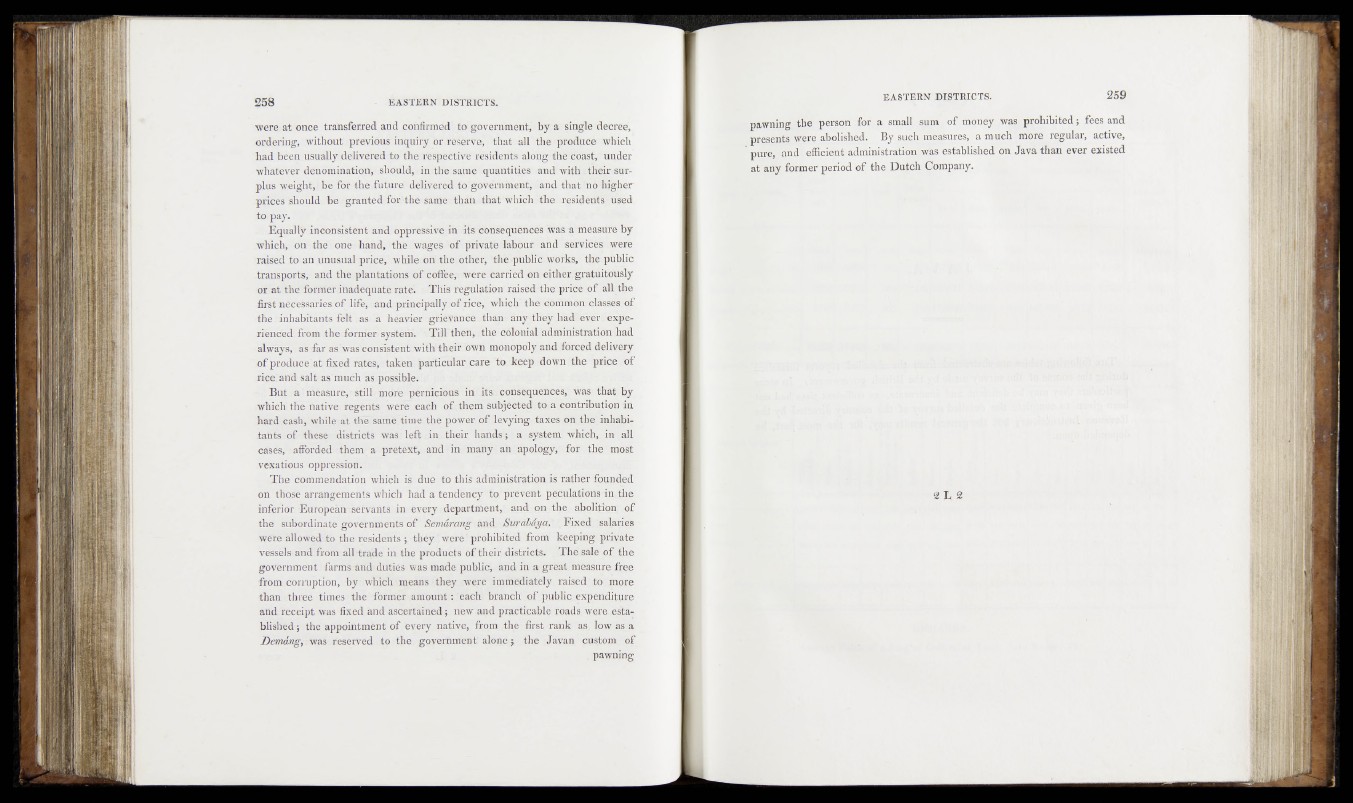
were at once transferxfed and confirm^^o-government,' by-a' single decree,
ordering, without,previous inquiry'b^eS^veTJithat all -the'tproduce which
had been usually delivered to the- respective residents alongifK^hoast^under
whatever denbfnin&tibftmshduld; - infthersarne quantities' (and1’ withi: their jsfrr-
plus weight,:be forlheifuture^deMyere4'to'government,-iand thatino-higher
-prices 'should, be granted* for'-the safe e-than that whichJthe a^esident^cised
ioifay.
Equally incbnsistent and oppressive in its consequences was. a measure by
which, on the—one- hand, the wagesfof privatb labour and •jservices'j-were
'raised to an unusual-price, whilei onr the other, ‘the »public works, the public
transports; and the plantations of cofleep^erdlfcafned on either, gra^jh^isly
or at the former inadequate rate. This regulation raised-the- price>lofijlft;tbe
first necessariesfof lifejoand principally ofrrcfe,, whichr!;he'jG6mmbn?olass^S^,
•the.; inhabitants felt ias. ’a heavier -grievance ithajmany;itfey,,hadlp^ruexperienced
from .the.former. system. Till'then;.j.the cdlonialhdmimstaati’dnhad
•always,- as far asiwas'consistent with their owix monbpol^andlfbrgedideli.very
of produce'.at-fixed rates, taken .particular care to.:ke'ep. /down the ptipevfef
ragefand salt as much asipossible;!,; .
But. a ’ measure, - still /more/ pernicious iti< itsfrqcms^pisnces,vwas .that by
which'the native regents were each ofcthem -subjected; fio>a tpi^ijiutioil'in
hard-cash, while at the Same time the power/of levying, taxes Snathe' inhabitants
of theses»'districts was'left cin .their hahdsj?, a system which, in all
cases,--afforded them a pretext, and in many anJapology,■ ^d^the^mogt
.vexatious -oppre'ssioni! :
•Thecommendation which is dufeto this ad ministration, is bafhbr-ffounded
on those arrangements which had a f e n d e n ^ fd v e h t pecula,tipns-in^||c
inferior -European :servants in fevery. department,1 and pn^the^ abolition' of
the subordinate governments of Smtiratig.- miiiBxtrdbdyal’ ; Fixed; ;salarie,s
wete allowed.to the residents ; -they' were’ prohibited fee'm keeping- piiyate
veS'selsfend from-all 4trade in the products ofihlir distriite The sale of the
government J farms and duties was made public, and in a great. feeasure^Fee
from corruption, -by which '.means they .were immediately raised. to^more
than,-.three times; the former .amount':Ieach branch of.public expenditure
and, receipt was fixed and ascertained; new and practicable roads were-esta-
blished-j the appointment of every native, from the first rank as. low as a
Demang,, was reserve'd to - the government’ a loneth e Javan custom, of
. pawning
pawning the person -for, a,smal%i^intiolgjfl^v.jwas prohibited; fee^ and
prcco n ^ ^e.-|aCfafflp^^ .■ 'By .sugM^^ures; a mufch ffllor&fegular, active,
pure, an g i s Slv^is esfeblishedbpn Jayai than ever existed
at any former period of the Dufeh Company.
2 E 2